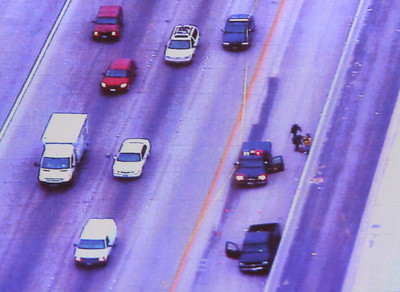Death ‘excusable’
Melanie Hunsaker said her brother was "so close to achieving all of his dreams" when he died Jan. 4 after an encounter with a Nevada Highway Patrol trooper.
"This has definitely been the most pain that our family's ever had to deal with," Hunsaker said Friday. "He was just an amazing man, and we miss him."
Hunsaker, a resident of Twin Falls, Idaho, joined members of her family Friday at a coroner's inquest into the death of Ryan Rich, 33, a Las Vegas doctor.
The jury's six women and one man deliberated about an hour before declaring the death excusable.
"It's just what we expected," Hunsaker said.
Jurors had the option of declaring the death either excusable, justifiable or criminal. The excusable verdict suggests that jurors did not believe anyone killed Rich intentionally.
Hunsaker and other relatives declined to talk further about the verdict. Attorney Brice Crafton, who represented the family at the inquest, advised them to limit their comments.
When asked whether the family planned to file a lawsuit, Crafton said, "We're investigating all options. We're just looking to find out what happened."
Three jurors who were located after the inquest declined to comment.
A verdict form asked the jury to list the name of the person who caused the death. Instead of a name, the phrase "seizure caused cardiac arrest" was written on the form.
Piotr Kubiczek, a forensic pathologist who performed the autopsy on Rich's body, was one of three witnesses who testified at the inquest. He told the jury about the autopsy results.
After consulting with an independent neuropathologist, Kubiczek concluded that the death was a homicide. He also concluded that it was caused by a seizure disorder with other conditions, including "restraining procedures."
"The restraining procedures contributed to the decedent's death with what was consistent with postictal state," according to the autopsy report.
"Postictal state" is the altered state of consciousness that a person enters after experiencing an epileptic seizure. Its symptoms include drowsiness and confusion.
Highway Patrol trooper Loren Lazoff testified that he was driving to a meeting when he saw Rich's pickup strike two other vehicles before crashing into the median of Interstate 15, near the Las Vegas Beltway.
Lazoff said he knocked on the passenger-side window, but Rich merely glanced at him before continuing to look straight ahead.
"At that point, I'm thinking he's probably impaired in some way," the trooper testified.
Tests showed that Rich had seizure medication, but no alcohol or illegal drugs, in his system at the time of his death.
Lazoff said he returned to his vehicle and removed a baton, which he used to break the window on Rich's vehicle, which was locked.
The trooper then turned the ignition off and began asking Rich questions but received no response. When he ordered Rich out of the vehicle, the driver "dog-crawled" across the pickup's bench seat, and Lazoff tried to handcuff him.
Lazoff testified that Rich then went into a "fight mode" and ended up flat on his back.
"I have his right wrist at that point," the trooper said.
He said Rich, who was wearing medical clothing commonly called "scrubs," continued resisting attempts to roll him over onto his stomach. During the struggle, the trooper said, Rich headed out into traffic.
Lazoff said he then let go of Rich's wrist and pulled out his stun gun.
"He's fighting it, and we're heading out into traffic, and it's going to get bad real fast," the trooper said.
Lazoff said he fired his stun gun at Rich, who fell backward into the travel lane. The trooper then pulled him back onto the shoulder and continued commanding him to roll over.
The trooper said he stunned Rich a total of five times without success. He succeeded in getting handcuffs on Rich only after a witness offered to help.
Lazoff, who joined the Highway Patrol about four years ago, said he had never before used a stun gun on a suspect. His law enforcement experience includes 10 years as a police officer in Montana.
Craig Morris, an oral and maxillofacial surgeon in Las Vegas, said he stopped to help the pickup driver after he heard a boom and looked in his rear-view mirror to see the vehicle crash into the median. He suspected the driver had suffered a heart attack until he approached the man, who "seemed to be dazed."
Morris said he watched the encounter between Lazoff and the driver. After helping restrain the driver, Morris began walking with Lazoff toward the trooper's vehicle.
As they walked away, Morris looked back and noticed that Rich had turned blue. The two returned to Rich, turned him over and began trying to resuscitate him.
When paramedics arrived, Morris told them he suspected Rich was under the influence of a narcotic. He said he never heard Rich say anything coherent.
Morris said he did not think Lazoff could have handled the situation differently. "The victim was very combative," the witness said.
Lazoff said he used his stun gun to keep Rich from stepping out into traffic and harming himself. The trooper said he made the right choice under the circumstances, despite the outcome.
Rich died shortly after being taken from the scene to Spring Valley Hospital Medical Center.
His father, Randy Rich of Rupert, Idaho, attended the inquest and said his son had recently been diagnosed with a seizure disorder. He said his son was completing the last year of his medical residency at Valley Hospital Medical Center and had a 9-year-old daughter, who lives in Utah.
Contact reporter Carri Geer Thevenot at cgeer@reviewjournal.com or 702-380-8135.


















